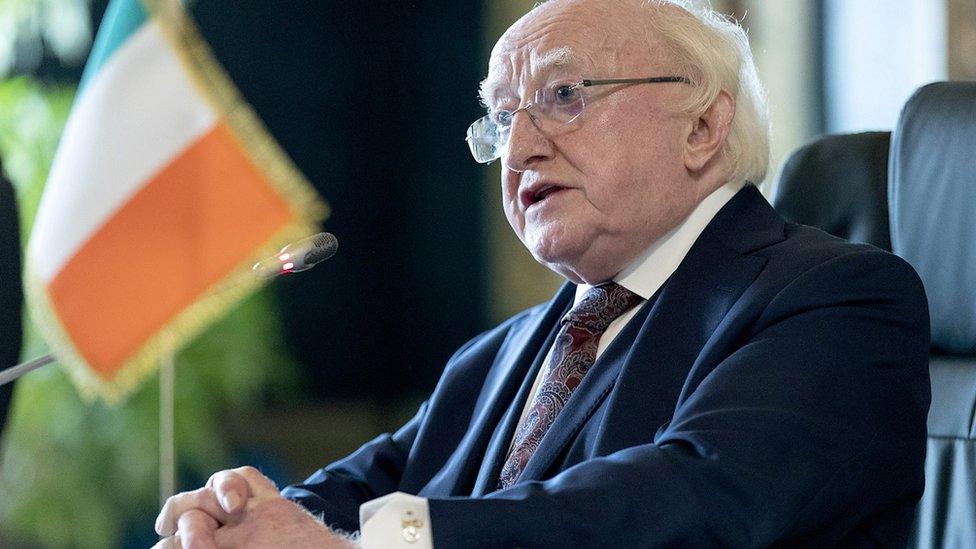NI100: Michael D Higgins defends decision not to attend centenary event
- Published
'It isn't a neutral statement politically'
Irish President Michael D Higgins has continued to defend his decision not to attend a church service to mark the centenary of Northern Ireland.
The Queen is among the guests due to attend the event in Armagh on 21 October, and Mr Higgins denied that his decision was a snub to the Queen.
He said he declined the invite because the event had become politicised.
President Higgins said the title of the service made it "inappropriate" for him to attend as head of state.
The Armagh church service has been organised to "mark the centenaries of the partition of Ireland and the formation of Northern Ireland".
Speaking in Rome, where he met Pope Francis on Friday, President Higgins said he felt the title "wasn't a neutral statement politically".
He explained that he had been considering the invitation for about six months, and in the week before St Patrick's Day, he shared his concerns with the organisers of the event.
President Higgins said he recalled saying: "We must do everything we can to support each other's events, but if this event is titled as it is, and structured as it is, it would present difficulties."
'Small confusion'
During an interview with the Irish Times, external on Thursday, President Higgins also said he had been incorrectly referred to as the president of the Republic of Ireland in the invitation rather than the president of Ireland.
However, in the press conference in Rome, he corrected his earlier statement about how he had been titled.
"I do want to clarify one point in my interview yesterday with Harry [McGee], that I may be responsible for creating a small confusion, and that is - the organisers writing to my office have always referred to me as president of Ireland," he said.
"The reference to the president of the Republic of Ireland is really the remark of the leadership of the DUP."
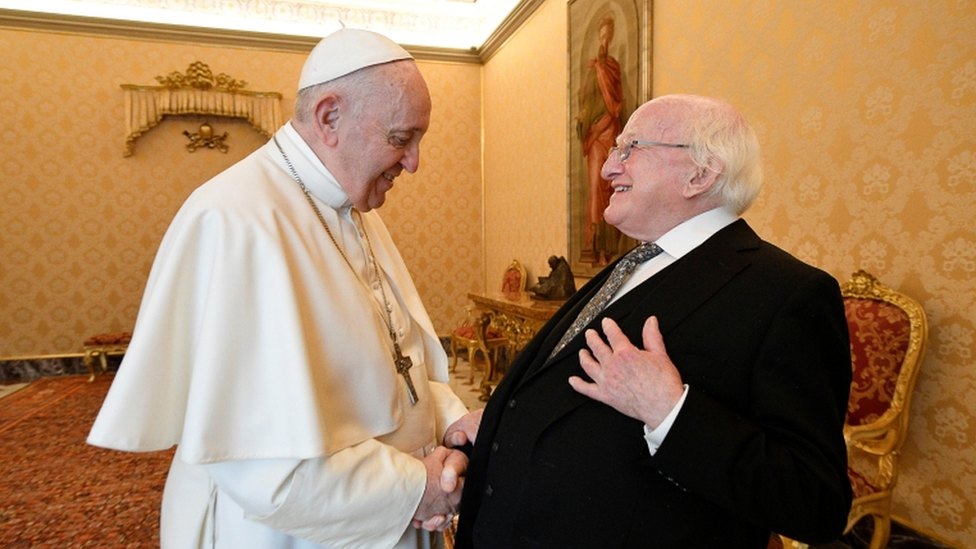
Pope Francis with Irish President Michael D Higgins during his visit to the Vatican on Friday morning
President Higgins insisted that he had been a "regular" visitor to Northern Ireland and "had no difficulties appearing in Northern Ireland with Her Majesty".
He explained that his decision to decline the invitation was not a sudden one, saying he had given the matter proper consideration.
"When you are president, and you are responsible for the long vision you have to take all of the consequences into account and all of the interpretations, and I did that," he said.
The president also took issue with some commentators who had criticised his decision not to attend the Armagh event and those who were "telling me what I have to do".
Criticism
In his newspaper interview on Thursday, the president said he was "not snubbing anyone and I am not part of anyone's boycott or any other events in Northern Ireland".
"I wish their service well but they understand that I have the right to exercise discretion as to what I think is appropriate," he added.
The president's decision provoked criticism in Northern Ireland, with Democratic Unionist Party (DUP) leader Sir Jeffrey Donaldson saying it was a "disappointing and retrograde step".
However, President Higgins said criticism from the DUP was "a bit much".
"I have gone up to Northern Ireland to take part in events. There often has not been a great deal of traffic down from the DUP people who are criticising me now."
Sir Jeffrey said the president's comments were "not conducive to reconciliation" and added that he was disappointed by his remarks about the DUP.
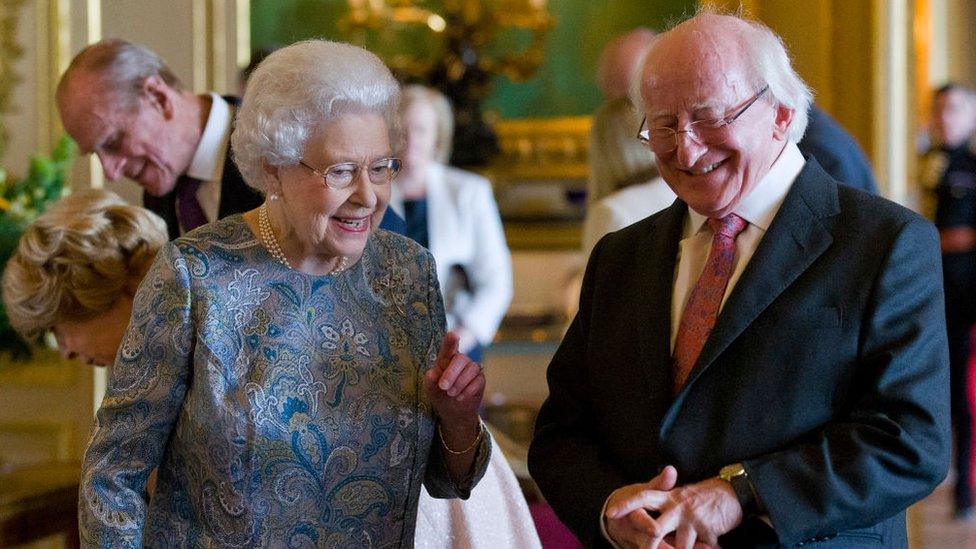
President Higgins with the Queen, who has also been invited to the service, during a state visit to the UK in 2014
'Correct decision'
He told BBC Radio UIster's Good Morning Ulster programme on Friday morning that the church service was intended to mark the event of the centenary and "reflect where we are".
"It is not just my party that has raised this as a concern. unionists will be disappointed," he said.
"Failing to recognise the existence of Northern Ireland does not help anybody."
Sinn Féin President Mary Lou McDonald, however, tweeted that the partition of Ireland had been a "catastrophe for our people and our country".
Allow X content?
This article contains content provided by X. We ask for your permission before anything is loaded, as they may be using cookies and other technologies. You may want to read X’s cookie policy, external and privacy policy, external before accepting. To view this content choose ‘accept and continue’.
She added: "The partition of Ireland costs us to this day, holds us back, divides us. Uachtarán na hÉireann has made clear his decision not to attend a commemorative event. His decision is the correct one."
Sinn Féin assembly member Declan Kearney, speaking at another centenary event held in Belfast on Friday, said the party had not yet received an invitation to October's church service but added: "If we do so, we too will be declining it."
The leader of the Catholic Church in Ireland said it would have been "very special" if President Higgins was able to attend the church service and said his absence was "unexpected".
Archbishop Eamon Martin added that the event was "completely non-political" and was intended to provide a moment for prayer and reflection.
Newly appointed Northern Ireland Minister Conor Burns, also in attendance at the Union Theological College service, said it was "a matter for the president of the Irish Republic to decide what diary commitments he accepts and what he doesn't".
"We will carry on marking a very historic, inclusive event for all communities in Northern Ireland," he added.
SDLP leader Colum Eastwood called for political leaders across the island to "pause and reflect on the weight of their words".
He said "cynical criticism" of President Higgins' decision not to attend the event would "not advance the cause of reconciliation, particularly when it comes from quarters that have downplayed and degraded the importance of all-island cooperation for two decades".
"I would respectfully ask that those for whom this is disappointing reflect on the honest remarks made by President Higgins last night and understand the views of those for whom partition is not a cause for celebration or commemoration," he added.


Once elected Irish presidents, like the Queen, are rarely criticised and are expected to be above daily politics.
So, it is no surprise there has been to date a largely muted reaction south of the border to President Higgins' decision not to attend the centenary event organised by the four main Christian churches.
Those few voices that have asked him to reconsider his position have done so in the name of north-south reconciliation - a cause he would argue he has been to the forefront of with his first state visit to the UK by an Irish president.
Those who support his decision say no head of state of any country could acquiesce to an event that marked the partitioning of his country and caused huge harm.
In past comments, President Higgins, who was a left-wing politician, has spoken about "ethical remembrance" and reminding the British of their role in colonialism and imperialism and the legacy of that for descendants.
While his non-attendance at the event has been criticised by unionist and other politicians, it is unlikely to damage his reputation south of the border where the controversy is largely seen as - at least until now - a "political bubble" story.

Responding to President Higgins' explanation for not attending the church service, Ulster Unionist MLA Mike Nesbitt said he had previously admired the president's outreach.
"If there was a problem with language then there is no reason why the presidential support staff could not have opened a quiet back channel to resolve all issues of language," he said.
'No clear advice' from Irish government
He added that the issue had the potential to "infect good relations and reconciliation".
Alliance MP Stephen Farry previously called on President Higgins to reconsider his decision, saying the event was "very much in keeping with the reconciliation efforts of successive Irish presidents and the Queen".
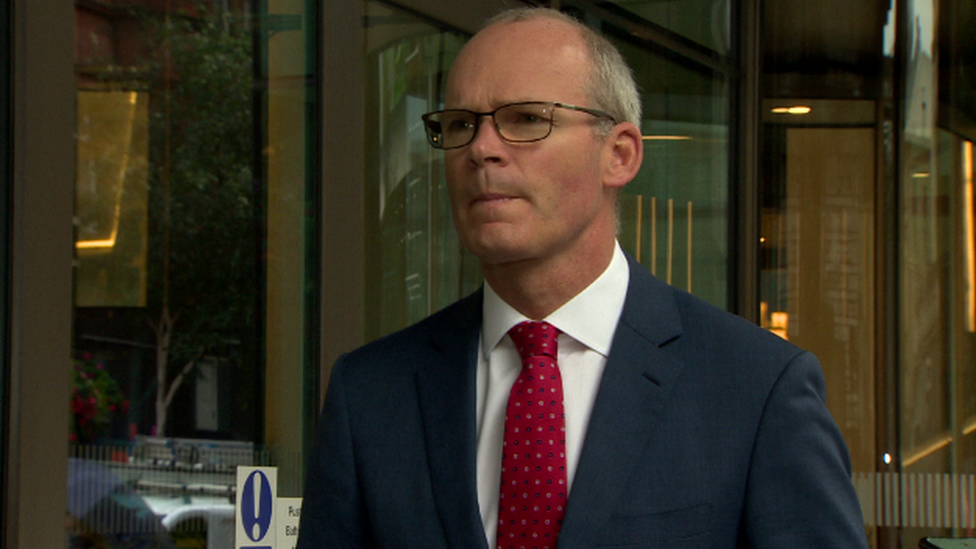
Simon Coveney says the government did not give "clear advice" on whether or not President Higgins should attend
Irish Foreign Affairs Minister Simon Coveney travelled to Belfast on Friday to continue talks with Stormont parties as the controversy over the service continues.
Speaking ahead of another event to mark the centenary organised by the Presbyterian church, he confirmed the Irish government had been consulted about the president's invitation to the church service.
But he said there was no "clear advice" given on whether or not he should attend.
He added President Higgins had made his own decision and that had to be respected.
The Irish government previously said the issue of attendance at the service was a matter for the president alone and any invitation for a government representative to attend would be considered.
- Published16 September 2021
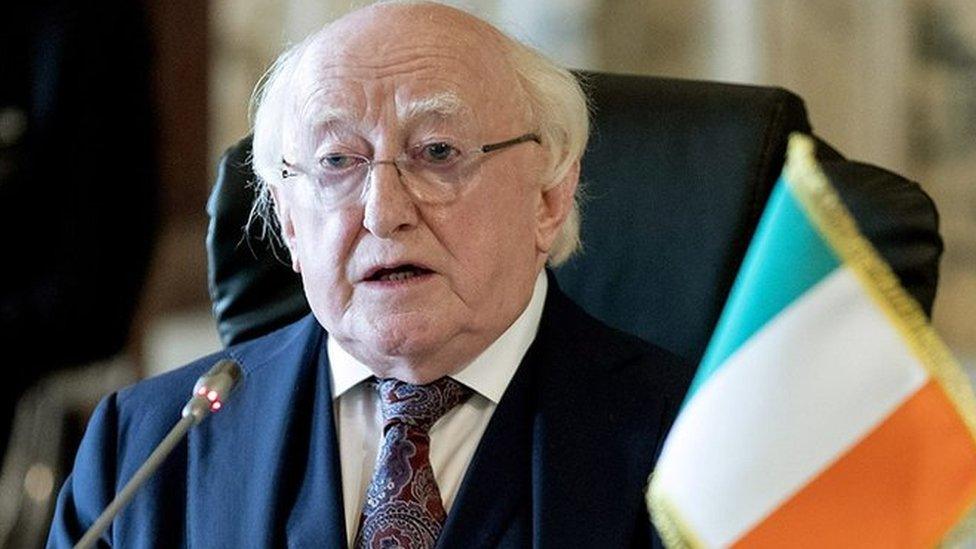
- Published15 September 2021
